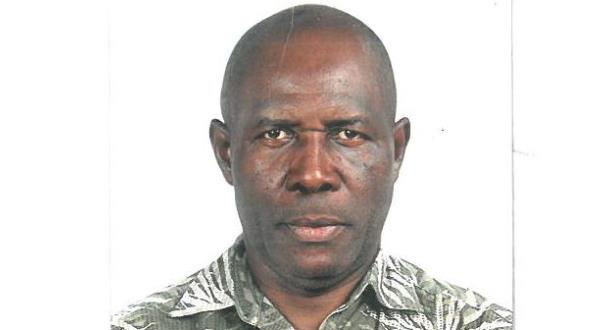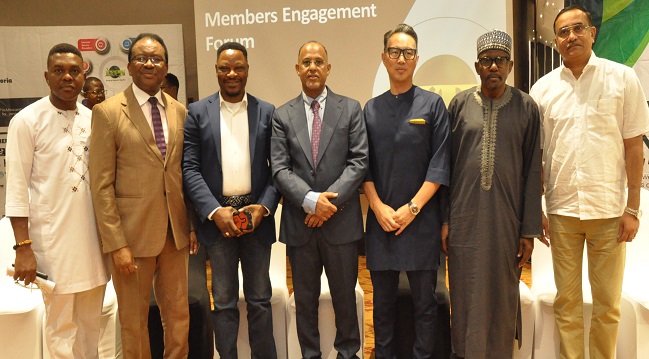Telecom
National Security via Satellite: (3 of 3; Concluding)

By Andrew Aroh
Satellite communications can play an important role in national security.

The role of this technology is better understood today on the front lines in particular where the following prefer to have robust and redundant communication links close at hand:
- Law enforcement personnel
- Incident commanders
- First responders
The committee on national security has many priorities but need to begin to examine the role that Satellite technology plays in our economy and Security.
The question is:
Has the National Security Team and its affiliated agencies already use satellite technology and commercial satcom for a range of national security related mission?
The answers are:
- An approach that is more focused and coordinated across agencies and authorities would allow a better and more cost-effect use of satellite across the national security establishment.
- The government should create a forum where its needs and the private sector’s capabilities can be examined on a regular basis.
- Lately, the National Emergency management Agency (NEMA) has became n enthusiastic use of satellite communications.
- In NEMA’s disaster field office operations, Satellite based voice, data and video-including full motion video-can be uplink to remote offices in effect matching a fixed facility NEMA office.
- NEMA is familiar with the cospa-sarsat for voice services and a data only satellite capability is available with virtual private Network tunneling, but this system is very limited in terms of bandwidth and does not provide digitized voice or video.
- NEMA needs to upgrade its communication facilities:
MERS:
This is a Mobile Emergency response support involving transportable C-/Ku/Ka-band system in additional to NEMA’s vehicle mounted systems.
This system allows us the flexibility of supporting more independent locations simultaneously, and greatly reduces response time to distant locations due to the ease of air transport versus driving.
NEMA needs to provide L-band capabilities to its earth stations for up to date requirements.
NEMA needs to acquire several DBS system that will be used to provide network connectivity to co-located disaster support staff other than NEMA, including state and local government personnel along with the support staff from other agencies such as the Environmental protection Agency.
An independent body once conducted a lengthy assessment of the nationwide Emergency Alert System (EAS) and the possible use of satellite technology emerged as a key component in the list of recommendations. This recommendation has come about because satellite technology:
- Can be used to deliver an EAS message very quickly (within seconds).
- Is very reliable
- Has available high levels of security.
- Does not have the geographical limitations of today’s EAS system.
Satellite delivery of EAS alerts will be the preferred delivery methods within the next few years. What measures are necessary to provide the required facilities?
Satellite facilities currently exist in nearly all radio, television and cable system for the purpose of delivering network feeds. These systems with proper coordination could easily be configured to carry EAS traffic.
Once enough broadcasting facilities are provided, state emergency management agencies and other agencies convert to satellite delivery, the Nigerian communication commission (NCC) will act accordingly.
Professionals lead the way in working with public television stations in development of a hybrid system using satellite and IP data casting technology.
The National Security Team need to evaluate Satellite-based messaging and alert system such as EMNET (Emergency Management Networking) to be deployed all over the 36 states in Nigeria.
- Satellites: Enabling ports and ocean’s offshore links when it comes to protecting seaports and coastal zones, the nation’s maritime administration and safety agency and authorities are routinely in touch via satellite with vessels under way and remote shore-based users using both voice and data links.
- Satellite plays an important role in navigation and the maritime agencies search and rescue operations as well.
- The maritime agency is constantly in search of smaller mobile terminals for ships less than 30 meters in length.
- IP demand-oriented networks is a direction in which the maritime authorities and agencies are trying to head.
- Satellites are a must setting up response centers until more permanent means of communications can be put in place, if any.
- Satellites are a must for remote, disadvantaged users for access to critical information.
- The maritime authorities and agencies need to frequently demonstrate how they can use satellite technology effectively in a variety of emergency response scenarios, sometimes acting as a facilitators in order to assist other agencies.
- Response teams need satellite during emergencies to facilitate other state department and agencies with accessing databases and with the integration of various non-interoperable radio communications.
CREATING ADVANCED TECHNOLOGY RESEARCH CENTER:
With the growing emphasis at the presidency and elsewhere on a rapid response squad to emergencies and terrorism, projects such as:
- Disaster response and emergency medical services (DREAMS) are meant to explore ways to use Satellite links to meet a number of needs.
- This advanced mobile medical communications and remote treatment concept revolves around the availability anywhere of two-way video, audio and data communications in ambulances, military vehicles and remote hospitals.
- The project involves using Ku-band/Ka-band hub terminals, commissioned and fully operational to plan a series of experiments that will operate between facilities at different hubs.
- Those experiments will operate IP over DVB bi-directionally.
- The end goal is to deliver IP over DVB to the ambulance (mobile) node in order to dramatically reduce the cost, footprint and power requirements of the data receiver on the ambulance. A typical configuration supports fully duplex data rate of 2.048Mbps
- Testing need to be conducted on the ambulance terminal with the hub in various configurations such as 2.048Mbps (E1).
- Another role of Satellite equipped specialized vehicle involves rapid telecom infrastructure restoration at remote locations.
- This may involves hub terminal addiction of the office of Emergency Management and Communications. Purchasing a small slice of dedicated Satellite bandwidth to support the vehicle and subsequently buying a larger slice in coordination with other entities is ideal.
Satellite Technology enabling Airport Emergency Communications:
- A new Satellite equipped mobile command post (MCP) supports an operating team of a dozen people which can remain on scene for as long as a week with Satellite based video conferencing and remote database access, among other things.
- The vehicle is intentionally designed with some generic components to allow responders from various departments including national security team to be able to use the vehicles capabilities.
- Dual Satellite phones are onboard the vehicles in case cellular phone services crashes or degrades.
- Via IP date transmissions over Satellite, MCP personnel can maintain contact with the fixed facility Emergency Operations Center (EOC), beaming back everything including:
- Photos
- Closed-circuit television feeds
- A forward looking infrared camera feed in instances where visibility on scene is impaired by smoke, for example.
LAW ENFORCEMENT NEED TO WARM UP TO SATELLITE:
The Nigerian Law Enforcement community needs to be on the frontline when it comes to national security.
- In large rural border state in particular, the use of Satellite technology is becoming increasingly common and widespread.
- A state police for a start may begin by equipping about 150 vehicles with Satellite delivered data communications. Through this means a state police stands to slash its data cost by 50 percent by ending the routine use of messaging from officers in the field.
- And as for new Satellite based solutions impacting operations for national security agents, the use of remote video feeds are required.
- The Satellite industry in Nigeria is watching and evaluating how to implement those for national security as time progresses.
- Definitely, at a time when an organization is not able to replace equipment at one time, any changes will have to be phased in to improve services.
- 1At the state level, the state patrol can begin to use trucks/vans equipped with two-way Satellite terminals to perform commercial vehicle enforcement tasks.
- The national security teams need to look at replacing its current systems with systems that will allow communications while a vehicle is in motion. The cost of purchasing and maintaining the systems is easily offset by the benefits in terms of improved communications, and the sharing of valuable data with out-of-state personnel.
- At the senate, many experts see the role of Satellite technology as a work in progress that for numerous reasons does not necessarily occupy a top slot on the national committee priority list. While I am sure that satellite technology has a role to play in national security, it is probably not a special role that the senate committee on national security should go out of its way to support just for the sake of going high tech. This is because most of what we need are:
- SENSORS
- Good computer databases
- Such hands-on technologies
- Patience
- Taking full advantage of Satellites to date.
- Taking full advantage of numerous capabilities across a very broad spectrum that could be very helpful.
- National security via satellite should not be a surprise to anyone judging by the events of today. This should be seen as the biggest reorganization in our 61years as a nation as well as the most complex problem requiring a very complex integrated set of solutions that the nation has ever had to face.
- As you can see, there is urgent need for the national security team and other state and local agencies to start using satellite technology more frequently along with other telecom and emergency response assets. The Nigerian Communications Commission (NCC) need to act fast to facilitate these involvement.
- When all is said and done, given the need for rapid access to vast information resources that can be updated in real-time. It is the incident commanders on scene who probably benefit the most by having a varidly of communications link close at hand. In many instances, a fixed mobile Satellite link should be viewed as a necessity, where the emerging global mobile personal communications (GMPCS) by satellite terminals are compulsory for national security.
CONCLUSION:
With the recent occurrences in Nigeria, including manmade and natural disasters, the National Security should be seeking Satellite solutions for its various agency needs for:
- Border patrol
- Command operations
- Control activities
- Emergency response operations
This is because Satellite enables those in a crisis situation or ones that are preventing one, to execute directives as soon as possible.
There are three areas where commercial satellite technology can significantly play a role:
- Communications
- Remote sensing
- Data information services such as weather
- Andrew Aroh is President SSPI Nigeria
Telecom
Cyber Immunity Emerges as Shield for Nigerians Amid Rising Scams

Cyber immunity is gaining traction as essential defence for everyday Nigerians facing surging online scams, phishing attacks, and SIM swap fraud that now target ordinary smartphone users.

Once limited to corporations, threats like fake bank alerts, WhatsApp investment links, and account takeovers have infiltrated daily digital life, outpacing basic antivirus and passwords.
Digital Immune System for Resilience
Cyber immunity integrates devices, apps, and user habits to prevent, detect, and recover from breaches, mimicking a body’s immune response rather than relying solely on firewalls.
Modern smartphones exemplify this with instant app restrictions, suspicious site warnings, and secure hardware for payments and biometrics, curbing damage from human errors like clicking bad links.
In Nigeria’s fintech-driven economy—banking, shopping, education online—individuals lag behind banks in security, making consistent vigilance critical.
Practical Steps Build Personal Defences
Key actions include password managers with 2FA and biometrics, automatic updates for vulnerability patches, cautious browsing (verify URLs, shun urgent requests), and routine data backups to cloud or external drives.
Ignoring updates to save data heightens risks on dominant Android devices, while messaging app scams demand wariness.
Technology aids via OS behaviour detection and isolation, reducing third-party app reliance for safer defaults.
As Nigeria’s digital expansion accelerates, cyber immunity shifts security from one-off setups to ongoing habits, averting minor scares from escalating to major losses.
Telecom
Uwaje Pays Tribute to Leo Stan Ekeh @70

Renowned digital innovation expert, Prof. Chris Uwaje, has celebrated Leo Stan Ekeh as a visionary “digital anticipator” and pioneer on the occasion of his 70th birthday.

Leo Stan Ekeh
In a heartfelt tribute, Uwaje hailed Ekeh as the “Saint Leo of all Stars from the Ekeh Universe,” saluting his masterclass contributions to human innovation, development, and global youth empowerment.
Visionary Impact on Africa, World
Uwaje praised Ekeh’s foresight, emotional intelligence, and resilience in transforming digital entrepreneurship, creating millions of jobs, billions in economic value, and expanded education access worldwide.
The encomium spotlighted Ekeh’s trailblazing solutions driving sustainable development, employment, and economic growth across Africa and beyond.
“Your legacy continues to shape a brighter future,” Uwaje noted, adding that Ekeh’s “extraordinary best is yet to come” as the “Field-Marshall of ANTICIPATORS.”
Cheers to More Foresighted Legacy
Uwaje declared: “From the gaze into the digital cloud: ‘the world ain’t seen nothing yet’!” while toasting Ekeh as the “true digital Conqueror of Africa and the world.”
The tribute underscores Ekeh’s enduring influence in digital disruption, innovation, and youth-focused initiatives that continue to inspire global progress.
Telecom
IXPN Positions as the Regional Internet Exchange Hub for West Africa

Internet Exchange Point of Nigeria is positioning as a regional Internet Exchange hub for West Africa in terms of infrastructure and traffic. Muhammed Rudman, chief executive officer, IXPN, stated this at its 2026 members engagement forum held in Lagos. He noted some of the major milestone IXPN achieved last year to include one terabit of traffic recorded in March 2025.

“At that time, we became the 63rd internet exchange point in the world. Among all the exchanges in Europe and America and in the entire world, we become the number 63 in the world. To achieve that one terabit of traffic. Again, we were able to achieve two terabits of traffic within seven, eight months of the year.
“We achieve this by ensuring that we push for members to upgrade, those that were on 1 Gig to 10 Gig, those on 10 Gig to 100 Gig. We had a strategic infrastructure upgrade across our networks, put 400 Gig enable switches, increase our fiber links to all the data centers and we onboarded 17 new members last year. All the trainings and the operational excellence ensured that our network is up and running 24/7,” he said.
Industry Impact
The impact of that one terabit traffic is data sovereignty. “We were able to domesticate. Based on the survey we conducted, 54% of our members said that they are exchanging 50% of their traffic and above locally, which is really, significant one.
“We are also setting up a benchmark for other African IXPs. I can assure you that in all the community driven internet exchange points in Africa, we are the number one. There’s a community driven internet exchange point in South Africa that was established 10 years before IXPN. There is one in Kenya that was established 6 years before IXPN, but we are way ahead of them when it comes to internet traffic.
“We are also promoting intra African connectivity. As at today, we have customers from Niger, from, Burkina Faso, trying to reach to Nigeria. Recently, we onboarded a very large company in Ivory Coast, to connect to Nigeria.
“Gradually, Nigeria is tilting towards becoming the regional hub for West Africa, where you see Internet Service Providers coming to achieve that. And in terms of the traffic, in 2015 we were at four Gigabits per second. It moves to 21 in 2017 and 52 gigabits per second.
“But by the year 2023 it has reached 540 gigabits. By 2024 we have reached 900 gigabits. But by the end of 2025 we have achieved the two terabits of traffic”.
Network Infrastructure Development
Some of the technical feet IXPN achieved includes, deployment of sFlow; which is a peer to peer traffic analysis. “We’re able to see what members are exchanging between themselves and between the data centers, not the actual content or information, but rather the volume of traffic, and also between our data centers. And based on this, we’re able to do the upgrades.
“We did a multiple link upgrades from 300 Gigabits last year from Digital Realty to Equinix. It was 300 Gig as at the end of 2024, and by 2025, we’ve increased that to 500 gigabits per second. Digital Realty to Rack Center, it was 200 Gigabits per second. We also upgraded that to 500 Gigabits per second.
Open Access Data Centre to Equinix. We’ve upgraded from 20 Gigabits per second to 200 Gigabits per second. We always monitor the ports, and based on that, we increase immediately we reach the threshold of 80%.
“We did an upgrade on the IXP manager. This allows each member to have a login portal to see the traffic they are exchanging and other details, the port as well as to do their own configuration,” he added.
Technical Project Milestones
Microsoft connected cache. “We deployed Microsoft content cache and that has been deployed in Lagos. It was 25 Gigabits per second as of 2024 by 2025 we had to upgrade the infrastructure to 75 Gigabits per second servers, that will be able to accommodate all the Microsoft updates they are doing, exports, download and among others.
“This is part of the content that Microsoft is not providing locally, but we got those servers deployed, and our intention is by next year to see how we can replicate this across the country. Last year, we also deployed the same server in Abuja so that the Abuja people and the Kano people can reach that content without coming back to Lagos.
The Google Global Cache (GGC); “We are hosting all these at IXPN. We also upgraded from 53 Gigabits per second servers in 2024 to 153 Gigabits per second. And this is a huge traffic of YouTube. And as we speak, we are also working towards upgrading those servers,” he explained.
Strategic Partnerships
“We signed an MoU last year between us and an IXP in Senegal, when we went for West African peering forum. A lot of African ISPs are looking to us to see how we can guide them and support them.
“For example, internet exchange point from Gabon, internet exchange point from Rwanda and ISPs in Africa are looking at us as a model to copy, and we tend to support them. We also had a strategic partnership with CIRA, the Canada Internet Registry Association, which is similar to Nira, the Nigerian Internet Registration Association, to have their secondary authoritative servers into Nigeria as an anycast instance. And when they are hosting that, they are hosting other top-level domains as well, like alibaba.info.org.ca, are also hosted with us.
“Since they launched last year, we have seen a traffic of over 1000 DNS responses per second. Presently, there are 13 global root servers in the world, and those 13 servers are the ones that translate your IP address into a domain name. Any website you browse, you put a domain name, it translates into an IP address and its chain of referrals, Nigeria has.ng as a country, called Top Level Domain”.
Earlier in his welcome address, Charles Nmeregini, Business Development Manager, IXPN, said that the members engagement forum is more than an annual country. “Today, we pause to celebrate the milestone, the milestone that we have reached together, the milestone that have bolstered our local traffic exchange, reduce latency and significantly lower the cost of Internet access across the nations and beyond.
“However, today is equally about the horizon. It is a strategic moment as we unveil our 2026 service road map, a forward-looking rubbing designed to deepen interconnection, enhance service delivery and unlock new value across the ecosystem. In an era defined by rapid technological shift, standing still is not an option.
“This forum will spotlight exclusive, strategic business opportunities, new avenues for growth, enhanced pairing capabilities and innovative service model tailored to give your organization a competitive edge. We are not just exchanging data, we are exchanging ideas that will drive the next wave of Nigeria digital economy,” he added.

 Telecom2 days ago
Telecom2 days agoGroup Condemns Gabon’s Social Media Shutdown Amid Protests

 E-Financial3 days ago
E-Financial3 days agoACAMB Educates Content Creator to Curb Misinformation on Bank Recapitalisation

 General News2 days ago
General News2 days agoHow JustMarkets Is Empowering African Traders with Global Market Access

 Telecom2 days ago
Telecom2 days agoIXPN Positions as the Regional Internet Exchange Hub for West Africa

 E-Business2 days ago
E-Business2 days agoMutual Benefits Assurance Settles ₦5.9bn Claims in January 2026

 Telecom2 days ago
Telecom2 days agoMenxtt NG Emerges as Nigeria’s Virtual IT Hub for Premium Devices, Solutions

 Broadcasting2 days ago
Broadcasting2 days agoPheelz Shares His Journey on Glo-Sponsored African Voices

 E-Business2 days ago
E-Business2 days agoNITDA DG Reaffirms FG Commitment to Responsible and Inclusive AI

























